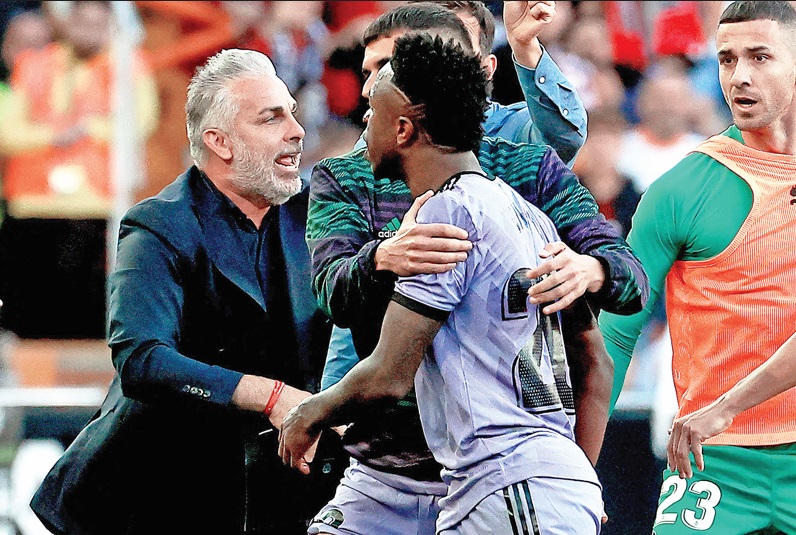
Vinícius Jr., a Brazilian forward for Real Madrid, was racially abused by some fans of Valencia during a Spanish La Liga match on Sunday, May 21, 2023.
He was called a monkey by a spectator in the 73rd minute of the game, which led to the activation of the racism protocol and a 10-minute stoppage of play.
He also got into a scuffle with Valencia player Hugo Duro in the final minutes of the game and was shown a red card for retaliation, while Duro escaped punishment despite choking him.
Real Madrid lost the game 1-0 and Vinícius Jr. expressed his outrage on social media, saying that racism is normal in La Liga and that Spain is known as a country of racists in Brazil.
Real Madrid manager Carlo Ancelotti also condemned the incident and said that referees should stop the game in other cases of racism.
Vinícius Jr. received support from his teammate ÉderMilitão, the president of the Brazilian football confederation Ednaldo Rodrigues, and many fans and anti-racism activists.
La Liga said it will investigate the incident and take legal action if any hate crime is identified.
The incident is the latest example of racism plaguing the soccer world, especially in Spain, where players like DaniAlves, Samuel Eto'o, and MouctarDiakhaby have also faced abuse in the past.
Racism is a persistent and widespread problem in Spanish football, where many players of different ethnicities and nationalities have faced abuse from fans, opponents, and even coaches.
Some of the most notable cases of racism in La Liga include Samuel Eto'o, who threatened to walk off the pitch after being called a monkey by Zaragoza fans in 2006; DaniAlves, who ate a banana thrown at him by Villarreal fans in 2014; and MouctarDiakhaby, who accused Cadiz's Juan Cala of calling him a "shitty Black" in 2021.
La Liga has been criticised for not taking sufficient action to prevent and punish racism, and for blaming the victims instead of the perpetrators.
For example, La Liga president Javier Tebas said that Vinícius Jr. should "inform himself properly" before criticising the league, and that there was no evidence of racism against Diakhaby.
Many anti-racism activists and organisations have called for more drastic measures to combat racism in Spanish football, such as banning fans, docking points, or suspending matches.
They have also urged players, clubs, and authorities to show more solidarity and support for the victims of racism.
Racism is not only a problem in Spanish football, but also in European football and Europe in general, where many people of colour face discrimination, violence, and hate speech on a daily basis.
Some of the recent examples of racism in European football include RomeluLukaku, who was abused by Juventus fans in Italy; KylianMbappe, who was targeted by online trolls after France lost the World Cup final; and Marcus Rashford and BukayoSaka, who were racially abused after missing penalties in the Euro 2020 final.
Racism is a form of discrimination and prejudice based on a person's skin colour, ethnicity, nationality, or any other difference that is used to dehumanize and exclude them.
Racism in football manifests itself in various ways, such as racist chants, insults, gestures, objects, banners, graffiti, online abuse, and violence directed at players, coaches, referees, staff, or fans.
Racism in football has negative impacts on the victims, such as psychological distress, anger, fear, shame, isolation, low self-esteem, poor performance, and loss of motivation.
Racism in football also harms the sport itself, as it undermines its values of fair play, respect, solidarity, and inclusion. It also damages the reputation and image of the clubs, leagues, and associations involved.
Racism in football reflects the wider social and historical context of racism in Europe, where people of colour have faced centuries of oppression, exploitation, colonization, slavery, genocide, segregation, and discrimination.
Racism in Europe is still prevalent today, as evidenced by the rise of far-right movements, hate crimes, anti-immigration policies, and xenophobic rhetoric.
Racism in football can be fought by various means, such as education, awareness-raising, reporting, sanctioning, monitoring, dialogue, campaigning, advocacy, and empowerment.
These actions require the collaboration and commitment of all stakeholders involved in football, such as players, coaches, referees, staff, fans, clubs, leagues, associations, media, sponsors, governments, and civil society.

